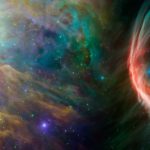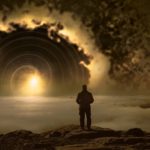The belief in God could be for some a path to lunacy, and for others, it is a path through lunacy, while for still others, it is actually a path from lunacy.
Who is the biggest lunatic amongst these three states? Who is the real lunatic here?
If God exists, it is almost certain then, that the lunatic would not be God.
Where does that leave us then?
This short article will give the writer’s own answer to the question of whether the belief in God is a path to lunacy, or not.
Trying to prove the unknowable from the known, often is a recipe for lunacy. Sure it is logical, and we can try to use our minds to do this, but it can never be satisfactorily done, especially in the case of God.
 This is because we are starting from our mind’s here in trying to prove the unknown by what our mind only thinks that they already know.
This is because we are starting from our mind’s here in trying to prove the unknown by what our mind only thinks that they already know.
When we start from the real knowledge that exists within our hearts, to our minds we are then using the unknown to prove the known, and our minds think that it is lunacy to try to prove anything from the unknown. We cannot use the unknown to prove the known, our minds will tell us, because this is back to front, and so this way of thinking can never be a logical approach.
Our mind wants us to start with what is known in order to then try to prove what is currently unknown, at least to it. Our mind likes to build from what it thinks that it already knows. This is why it is so hard to teach anybody who is full of their own knowledge of anything else.
Our minds only go in one way when following this approach.
It often takes an act of lunacy, for the mind to see that it is, in fact, acting in the same way.
This is why in Zen, we have the Zen koan. It attempts to break through the mind’s fixation on its own lunacy, because what it thinks that it knows is sacrosanct to it, and so this is why it is being held onto far too strongly by our minds.
Here is the Zen story about the overflowing teacup, that so nicely illustrates how insane most of us are, when we stick too fully to what we think that we already know, as being our own truth.
The story goes that Nan-in, who was a well known Japanese Zen master during the Meiji era (1868-1912), agreed to entertain an also equally well known foreign university professor, who had come to Japan to inquire about Zen.
This event took its place during the period when Emperor Meiji became the new head of state. Under the Meiji constitution, the Emperor held almost absolute power. The professor here also thought that he was powerful enough himself, and he just wanted to add to his own learning, by comparing it to what this so-called Zen master could tell him.
“I have come seeking enlightenment,” the professor proudly said, and he then arrogantly took a seat, even before he had been asked by the master to sit down.
The Zen Master bowed very low, and he went out and fetched a pot of tea. Returning to the room Nan-in then served the professor his tea.
He poured the tea until his visitor’s cup was full, and it then started to overflow, but even then he didn’t stop pouring, he kept right on pouring, and pouring, and pouring. Very soon the tea was spilling out over the table, and even down onto the floor
The professor, feeling rather agitated by all of this, watched the overflowing cup until he could no longer restrain himself anymore.
“It is already full,” he said, ” No more tea will fit into my cup!”
“Like this cup,” Nan-in then replied, “ you are full of your own opinions, ideas, and theories. How can I, or anyone else, show you the truth of Zen, unless you first empty your own cup?”
Knowing emptiness comes by first unknowing fullness.
Our hearts know that nothing is unknown, and that starting from either end, as being seen from our mind, achieves the same result. Both the unknown and the known are only being labeled as such by our own minds. Oneness knows what it knows unconsciously, the spiritual path is about creating the consciousness to be able to see itself from within itself.
Oneness reflects itself upon its infinite created parts, and when love moves between God and his parts, consciousness is created, like a magnetic field is created around moving electricity. Consciousness is unconsciousness’s mirror. The unconsciously known first becomes the consciously unknown, before growing itself in its own understanding to then finally also know itself consciously.
The unconsciously known becomes consciously known.
We know the unknown, not by unknowing the known, but by becoming now conscious of it. We finally know what we know. Only our hearts can achieve this state of conscious knowing. Our minds only serve us in knowing, and should never try to control our knowing.
 Our mind cannot handle this type of paradoxical truth, and therefore trying to solve it all logically could lead our minds into a sort of lunacy. This is a defensive strategy built around the fear of our own ego. Our ego thinks it knows, while our mind, if working for our ego, wants to prove us right. When it can not do so it retreats into a state of lunacy, or malfunctioning.
Our mind cannot handle this type of paradoxical truth, and therefore trying to solve it all logically could lead our minds into a sort of lunacy. This is a defensive strategy built around the fear of our own ego. Our ego thinks it knows, while our mind, if working for our ego, wants to prove us right. When it can not do so it retreats into a state of lunacy, or malfunctioning.
The real known and that is that which is already known within our hearts, will always remain unknown by our minds.
When we keep going on trying to prove what we already know in our hearts from within our minds, the path to God does indeed become a path to lunacy. A belief cannot be logically proven, otherwise it was not ever just a belief, after all.
What is lunacy?
Does following a spiritual path ever really lead us to lunacy, or does it always keep us away from this state, although at times we might momentarily touch it, or sometimes it might really seem like that we are actually going through it?
Lunacy is knowing the truth, and then doing something different. We call this sin in religious terms, but lunacy in psychological terms is keeping doing the same thing, and expecting a different result.
The greatness of God includes islands of lunacy, but these islands serve the purpose of being resting places for our minds. This is sometimes the case, especially when they need to be rested from their continual over-usage by being fuelled from our ego’s fear, and so burning out, rather than being fuelled by love, and thereby only increasing in its capacity to serve love.
A belief in God is only just that, a belief in God. Where it takes us to and through is largely up to our own selves. If it is a path to our lunacy, it is within this very lunacy, that we must then find God. God is everywhere, and there is nowhere where his love can not go, or reach into, to find us.






